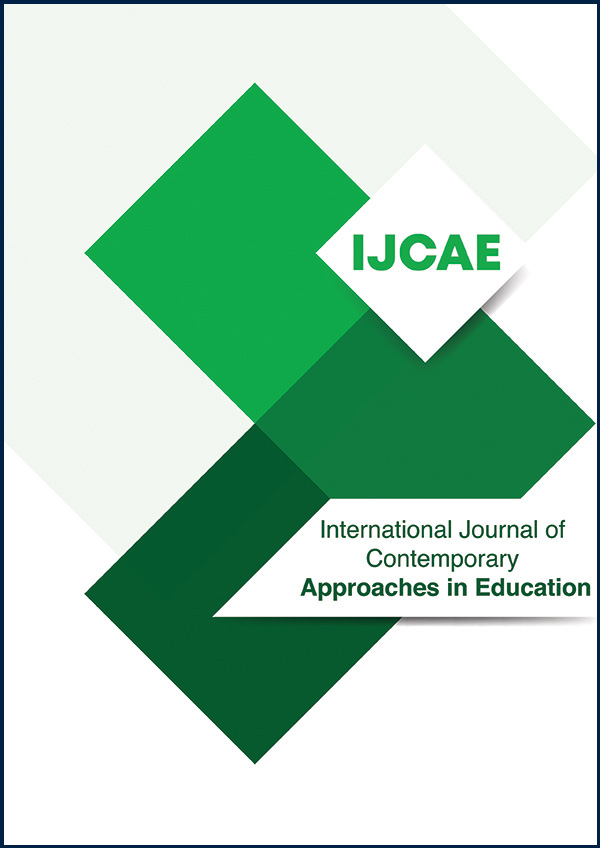- Alkış, N. (2009). Education for sustainable development: Theoretical and practical approaches. Journal of Ankara University Faculty of Educational Sciences, 42(1), 45–62. [Google Scholar]
- Ateş, M. (2019). Sustainable development in the science education curriculum. Education and Science, 44(197), 269–286. [Google Scholar]
- Aytar, B., & Özsevgeç, T. (2019). The importance of interdisciplinary approaches in science education. International Journal of Educational Research, 5(3), 101–114. [Google Scholar]
- Bencze, L., Bowen, G. M., Alsop, S., & Carter, L. (2013). Teaching sustainable development in science education: Perspectives from practice. International Journal of Science Education, 35(7), 1153–1177. https://doi.org/10.1080/09500693.2011.629016 [Google Scholar] [Crossref]
- Bilgili, M. (2017). Evaluation of teachers’ competencies in sustainable development. Educational Administration: Theory and Practice, 23(2), 210–225. [Google Scholar]
- Bailey, E. E., & Friedlaender, A. F. (1982). Market structure and multiproduct industries. Journal of Economic Literature, 20(3), 1024–1048. [Google Scholar]
- Çankaya, S. (2014). Awareness and attitudes of pre-service teachers towards environmental problems. Education and Society, 34(124), 67–84. [Google Scholar]
- Creswell, J. W. (2017). Research design: Qualitative, quantitative, and mixed methods approaches. [Invalid source: Facebook URL is not acceptable.] [Google Scholar]
- Demirer, V. (2006). Science teaching and new approaches. Ministry of National Education Publications. [Google Scholar]
- Demirbaş, M. (2015). Awareness levels of pre-service teachers on sustainable development. Journal of the Faculty of Education of Mehmet Akif Ersoy University, 1(36), 1–15. [Google Scholar]
- Demirbaş, M. (2011). Implementation of sustainable development themes in social studies courses. Journal of Social Sciences Institute, 29(1), 77–92. [Google Scholar]
- Demir, İ., & Atasoy, B. (2021). The relationship between students' sustainability knowledge and behaviors. Journal of Educational Research, 28(3), 345–360. [Google Scholar]
- Dere, İ., & Çınkaya, S. (2023). Analysis of the environmental education and climate change curriculum in terms of UN 2030 sustainable development goals. Turkish Journal of Social Research, 27(1), 1–20. [Google Scholar]
- Gayford, C. (2001). Attitudes to science: A review. International Journal of Science Education, 23(7), 711–721. https://doi.org/10.1080/09500690110033583 [Google Scholar] [Crossref]
- Gürdal, A. (1991). Science teaching: Concept development and ways of scientific thinking. Council of Higher Education Publications. [Google Scholar]
- Johnston, B. (2011). Environmental education and sustainability: A critical review. Environmental Education Research, 17(2), 243–255. https://doi.org/10.1080/13504622.2010.508633 [Google Scholar] [Crossref]
- Karasar, N. (2007). Scientific research method. Nobel Publishing. [Google Scholar]
- Kaya, B., & Tomal, N. (2011). Education for sustainable development in the social studies curriculum. International Eurasian Journal of Social Sciences, 2(5), 1–15. [Google Scholar]
- Kearney, L., & Tashlik, P. (1985). Cooperation and conflict: Teachers and researchers learn. Language Arts, 62(7), 765–769. [Google Scholar]
- Ko, M., & Lee, W. (2003). Student attitudes toward science and technology. Journal of Science Education, 24(4), 211–220. [Google Scholar]
- Lourdel, N., Klein, P., & Jeannerod, R. (2005). Development of sustainability education: A case study. Journal of Environmental Education, 36(4), 9–19. [Google Scholar]
- Ministry of National Education [MoNE]. (2013). Primary school science course curriculum. Board of Education, Ankara. [Google Scholar]
- Ministry of National Education [MoNE]. (2018). Primary school science course curriculum. Board of Education, Ankara. [Google Scholar]
- Ministry of National Education [MoNE]. (2018). Development of curricula: General information. Board of Education, Ankara. [Google Scholar]
- Ministry of National Education [MoNE]. (2024a). Türkiye Yüzyılı Maarif Model: Common text of curricula. Board of Education, Ankara. [Google Scholar]
- Ministry of National Education [MoNE]. (2024b). Türkiye Yüzyılı Maarif Model science course curriculum. Board of Education, Ankara. [Google Scholar]
- Ministry of National Education [MoNE]. (2024). 2024–2028 Strategic Plan. Ministry of National Education. [Google Scholar]
- Ministry of National Education [MoNE]. (2024). Türkiye Yüzyılı Maarif Model introductory booklet. MEB Publications. https://mufredat.meb.gov.tr/ [Google Scholar]
- Ministry of National Education [MoNE]. (2024). Science curriculum for secondary school (Grades 5–8). Board of Education. https://mufredat.meb.gov.tr/ [Google Scholar]
- McKeown, R., & Hopkins, C. (2007). Education for sustainable development: The global perspective. Journal of Education for Sustainable Development, 1(1), 12–20. [Google Scholar]
- Özgür, E. (2020). Analysis of sustainability themes in the science curriculum. Theory and Practice in Education, 16(3), 420–435. [Google Scholar]
- Öztürk, H. Y. (2016). The mediating role of functional capabilities in the effect of learning orientation on firm performance and the moderating effect of competition intensity [Master’s thesis, Yıldız Technical University]. National Thesis Center of the Council of Higher Education. https://tez.yok.gov.tr/ [Google Scholar]
- Pauw, I., Kleinbooi, K., & Botha, E. (2015). Integration of sustainability education in science curricula. International Journal of Sustainability in Higher Education, 16(4), 441–456. https://doi.org/10.1108/IJSHE-12-2013-0126 [Google Scholar] [Crossref]
- Pope, J., Annandale, D., & Morrison-Saunders, A. (2004). Conceptualising sustainability assessment. Environmental Impact Assessment Review, 24(6), 595–616. [Google Scholar]
- Şüheda, N., & Akçay, B. (2021). Teachers’ sustainability awareness and classroom practices. Journal of Qualitative Research in Education, 9(2), 180–197. [Google Scholar]
- UNESCO. (2014). Education for sustainable development: Sourcebook. Paris: UNESCO. [Google Scholar]
- United Nations Development Programme (UNDP). (2020). Sustainable development goals report 2020. UNDP. https://sdgs.un.org/publications [Google Scholar]
- World Commission on Environment and Development [WCED]. (1987). Our common future. Oxford University Press. [Google Scholar]
- Worster, D. (1993). Nature's economy: A history of ecological ideas. Cambridge University Press. [Google Scholar]
- Yıldırım, A., & Şimşek, H. (2016). Qualitative research methods in social sciences (10th ed.). Seçkin Publishing. [Google Scholar]
- Yıldırım, A., & Şimşek, H. (2021). Qualitative research methods (12th ed.). Seçkin Publishing. [Google Scholar]
|

